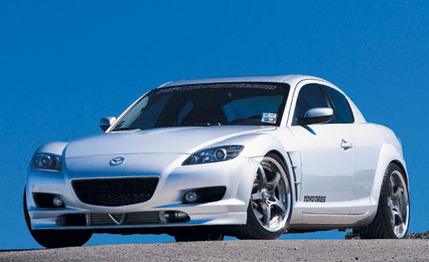 Specialty File
Specialty File
The Mazda RX-8 has an appealing combination of light and agile handling, a ride that doesn't abuse, and steering with a level of precision usually the purview of the surgical community. These attributes make it a gratifying back-road thriller, and with room for four and a starting price of about $27,000, it all adds up to a three-time 10Best Cars winner.
Still, nothing's perfect, and we've had a long-running beef with the rotary-powered Mazda's less-than-invigorating power. Its pistonless Renesis cranks out 238 horsepower, which isn't laughably low for a 3000-pound car, but its power peak happens way up at 8500 rpm. And although 159 pound-feet of torque is impressive for anything naturally aspirated displacing just 1.3 liters, it's not enough for us. There's minimal midrange, meaning seriously lazy throttle response below 5000 rpm.
That's why we've thought the RX-8 a perfect candidate for forced induction, and we've been waiting for a company such as Protech Performance (PTP) — a four-man operation in Austin, Texas — to bring one to life. "We needed a breakthrough in electronics," says PTP's computer guru, Jon Etheredge, in reference to the somewhat minimalist power gains made on earlier forced-induction kits for the RX-8. That breakthrough came with an engine-management system from HKS, the first "stand alone" system for the RX-8 that could fully conquer its electronic throttle and engine computer and take complete control of the six fuel injectors and spark timing.
The silver prototype PTP brought for us to test was just howling with power — 390 horsepower at 7400 rpm and 290 pound-feet of torque at 5100 rpm, according to our calculations with PTP's chassis dyno data. For those unqualified to operate a calculator, that's an 82-percent gain in torque and a colossal 152-hp increase.
The modifications center on PTP's $5000 bolt-on turbo kit, which will probably make more like 360 horses in customer trim. The kit includes a Garrett ball-bearing turbo spinning 13 pounds of boost, a PTP-designed stainless-steel exhaust manifold and down pipe that plumbs into the stock exhaust, a cold-air intake, a smaller battery (which provides the underhood space for the turbo), an intercooler, larger fuel injectors, a new oil pan, and all associated hardware to bolt it on. The kit doesn't include an engine-management system, however, so customers can order the $2000 HKS system, preprogrammed by PTP, or attempt the complex tuning process themselves with a different setup.
That means it's possible to acquire an RX-8 with the PTP turbo in place for about $33,000, including $900 for the installation. But PTP added a number of extras to the car we tested, elevating the price to $45,374. That long list included a Tein Flex adjustable coil-over suspension ($1480) with electronic damper adjustment ($550) and 19-inch Volk Racing wheels with Toyo Proxes T1-S tires ($3400). Powertrain upgrades included a water-injection system ($719) to keep intake-air temperatures cool as well as to enrich the air-fuel mixture, along with a higher-capacity clutch ($715), to make sure the power gets to the ground, and a custom three-inch exhaust.
On the street, PTP's RX-8 dishes out power in a surprisingly stock-feeling manner — there's just a lot more available, particularly above about 4000 rpm when the turbo comes aboard. That means it's easier to keep this RX-8 on the road than the huge power increase might suggest.
However, getting the wide rear Toyos (275/30-19s versus the stock Bridgestone 225/45-18s) to hook up for a standing-start launch is definitely tricky. Dancing a fine line between keeping boost up and wheelspin down, we blasted to 60 mph in 4.9 seconds and through the quarter-mile in 13.5 at 109 mph, an improvement of a full second over the stock version in both cases. (These numbers suggest more like 375 horses were present on test day, but we probably gave up some time during the touchy launch.)
But the turbo RX-8 is about more than just acceleration numbers. Throttle response is markedly improved, for example, and it doesn't suffer from levels of turbo lag often associated with high-boost engines. Especially impressive is acceleration at highway speeds, because in stock form, when you ask for a burst of power in sixth gear, there is no answer. Check out the flexibility times: The 5-to-60-mph time (5.6 seconds) is quicker than the stock RX-8's by 1.9 seconds; the 30-to-50-mph time (9.8 seconds) shows that a full second has been shed; and the 50-to-70-mph time (6.3 seconds) is a 3.7-second improvement.
The exhaust note is noticeably louder and more aggressive, but it's not overbearing. Compared with stock, the modified RX-8's 83-decibel full-throttle shout is 4 dBA higher, but while cruising at 70 mph, we recorded 72 dBA, which is one quieter.
Credit goes to the Tein suspension for erasing almost all body roll without an over-the-top, stiff ride. Skidpad grip increased 0.03 g, to 0.94.
Problems were few but included some minor engine surging at idle and a slight hesitation as the turbo wakes up, but PTP insists these shortcomings will be smoothed out before the first kit ships. Another niggle is a blinking check-engine light caused by the oxygen sensor seeing the rich air-fuel ratios associated with forced induction.
If you love the idea of a fine-driving four-seat sports car, you're sure to like one with 150 more horses that can run up the back of a Mustang GT. But fans of low torque and high rpm will need to reeducate that gas-pedal foot or risk the shock of experiencing a byproduct of PTP's kit — power oversteer.
Protech Performance, 808 McPhaul Street, Austin, Texas 78758; 512-834-8771; www.ptpmotorsports.com.